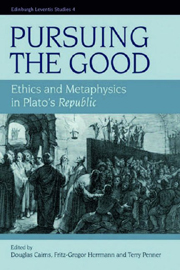Book contents
- Frontmatter
- Contents
- Preface
- Contributors and Editors
- Introduction
- 1 What is the Form of the Good the Form of? A Question about the Plot of the Republic
- 2 Glaucon's Challenge, Rational Egoism and Ordinary Morality
- 3 Thrasymachean Rulers, Altruistic Rulers and Socratic Rulers
- 4 Neutralism in Book I of the Republic
- 5 The Good, Advantage, Happiness and the Form of the Good: How Continuous with Socratic Ethics is Platonic Ethics?
- 6 The Form of the Good and the Good in Plato's Republic
- 7 Flourishing: The Central Concept of Practical Thought
- 8 Is Plato's Conception of the Form of the Good Contradictory?
- 9 The Good, Essences and Relations
- 10 The Idea of the Good and the Other Forms in Plato's Republic
- 11 The Aporia in the Charmides about Reflexive Knowledge and the Contribution to its Solution in the Sun Analogy of the Republic
- 12 The Good and Mathematics
- 13 The Good and Order: Does the Republic Display an Analogy Between a Science of Ethics and Mathematics?
- 14 Inquiry and Justification in the Search for the Highest Good in Plato and Aristotle
- 15 The Carpenter and the Good
- 16 Conversion or Conversation? A Note on Plato's Philosophical Methods
- Index
1 - What is the Form of the Good the Form of? A Question about the Plot of the Republic
Published online by Cambridge University Press: 12 September 2012
- Frontmatter
- Contents
- Preface
- Contributors and Editors
- Introduction
- 1 What is the Form of the Good the Form of? A Question about the Plot of the Republic
- 2 Glaucon's Challenge, Rational Egoism and Ordinary Morality
- 3 Thrasymachean Rulers, Altruistic Rulers and Socratic Rulers
- 4 Neutralism in Book I of the Republic
- 5 The Good, Advantage, Happiness and the Form of the Good: How Continuous with Socratic Ethics is Platonic Ethics?
- 6 The Form of the Good and the Good in Plato's Republic
- 7 Flourishing: The Central Concept of Practical Thought
- 8 Is Plato's Conception of the Form of the Good Contradictory?
- 9 The Good, Essences and Relations
- 10 The Idea of the Good and the Other Forms in Plato's Republic
- 11 The Aporia in the Charmides about Reflexive Knowledge and the Contribution to its Solution in the Sun Analogy of the Republic
- 12 The Good and Mathematics
- 13 The Good and Order: Does the Republic Display an Analogy Between a Science of Ethics and Mathematics?
- 14 Inquiry and Justification in the Search for the Highest Good in Plato and Aristotle
- 15 The Carpenter and the Good
- 16 Conversion or Conversation? A Note on Plato's Philosophical Methods
- Index
Summary
I have chosen a theme which I hope will turn out to be of equal appeal to classicists and to philosophers. This is the exploration of a very serious – and largely ignored – difficulty in our usual presentations of the plot of the Republic. True, details of plot over and above the fairly clear surface organization of this dialogue might seem of minimal interest to philosophers. One hears analytical philosophers objecting:
Are we not all about formulating and assessing arguments? If one's philosophical job in reading Plato is to assess arguments for what their premises say; what conclusions Socrates draws from them, and what other propositions are entailed by the propositions involved; then surely one is unlikely to find further considerations of plot or context of much relevance? What the premises and conclusions say (the propositions expressed), and what conclusions are entailed by what premises, and what other propositions are entailed by either (as determined by the semantics backing one's theory of entailment), surely requires no special attention to context within the drama. A few stray indexicals aside, it is unclear how any considerations of plot or dramatic context will be of much use to the job of figuring out what Plato is saying philosophically.
Such objections now seem to me seriously misguided. This evening, I hope to demonstrate, by means of a single example, that explorations of plot difficulties can shed important new light on what Plato is up to, even philosophically, in the Republic.
- Type
- Chapter
- Information
- Pursuing the GoodEthics and Metaphysics in Plato's Republic, pp. 15 - 41Publisher: Edinburgh University PressPrint publication year: 2007



